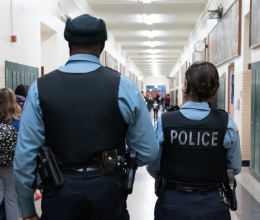In part because of the advocacy of two students, Des Moines Public Schools (DMPS) finally ended its harmful School Resource Officer (SRO) program. Now, those two students—Endí Montalvo-Martinez, age 18, and Lyric Sellers, age 17—are being awarded our Robert Mannheimer Youth Advocacy Award for their important work.
Endí and Lyric, then students at East High School, created a powerful racial equity proposal on their own time and through their own initiative. It documented the racial disparities perpetuated by police in schools and was an important element in the district's decision to remove armed police from its buildings.
Endí and Lyric created the proposal because they knew many of their peers, especially other students of color, were intimidated by SROs. They reached out to the Iowa Department of Human Rights and gathered data on racial disparities perpetuated by the SRO program. Data showed Black students were six times more likely to interact with police officers in DMPS schools than white students.
The results came as no surprise to the students. "I just don't feel comfortable around police. I never have because I see exactly what they do to people that look like me," said Lyric, a senior at East High School. "When you walk into your building and see an officer, you immediately feel distrusted by the people in your building."
Endí and Lyric's research for the proposal also found that most infractions handled by SROs rarely amounted to even a simple misdemeanor and could often be handled within school buildings using a restorative justice model.
"SROs don't ensure student safety. SRO programs just give some people a sense of safety. But we see through the data and lived experience of students that SROs don't actually help," said Endí, now a community public health major at Iowa State University. "I think it's very wrong not to reimagine a new system that does work for students."
Other components of Endí and Lyric's proposal included implementing classes like Chicano studies, African American studies, and LGBTQ history at East High School. They also successfully advocated for removing the offensive Native American mascot at their school. They also planned a restorative justice town hall to receive community feedback on how DMPS could better respond to and prevent peer-to-peer and peer-to-teacher altercations. Additionally, they offered a district-wide, two-week leadership retreat for younger students.
Lyric is currently a senior at East High School and participates in student activism, along with basketball and theater. She plans to attend ISU and major in communications.
Endí is now the co-founder of the Color of Love, a student organization at ISU that focuses on building community with students of color on campus and providing opportunities for student-based organizing. Endí is also building a pipeline of mentorships between students at East High School and Iowa State.
The ACLU of Iowa Robert Mannheimer Youth Advocacy Award is a $500 cash prize given to a young Iowan aged 14 to 19 who has demonstrated a passion and advocacy for civil liberties. It is named as a memorial to Des Moines attorney and civil liberties advocate Robert Mannheimer.
"We applaud and honor the activism and advocacy of Endi and Lyric," said ACLU of Iowa Executive Director Mark Stringer. "Their inspiring efforts and success remind us that we all have roles to play in creating positive change and building community."
A second-place award goes to Gabe Barnes of Cedar Falls. Gabe has done significant LGBTQ rights activism throughout his middle and high school years, notably organizing GSA meetings and activities that spanned multiple middle and high schools in the Cedar Rapids school district.
A third-place award goes to Beatrice Kaskie of Iowa City. Beatrice founded and amplified multiple youth justice groups and programs during her four years at Iowa City Liberty High School, starting largely from scratch since the school is only five years old.






